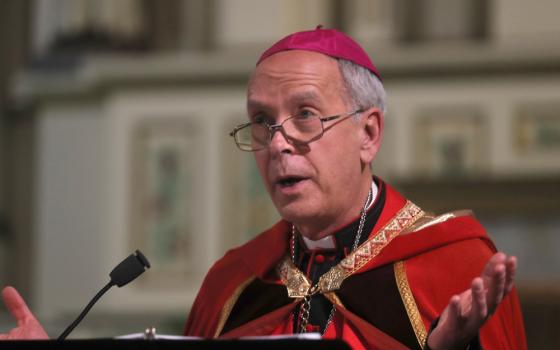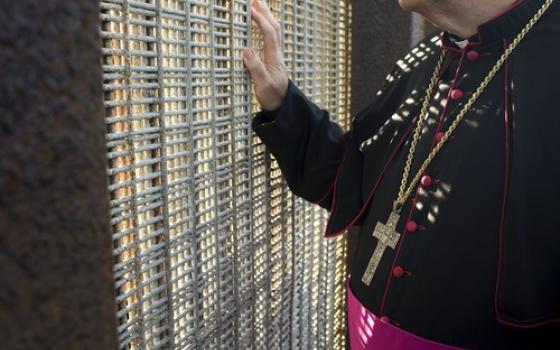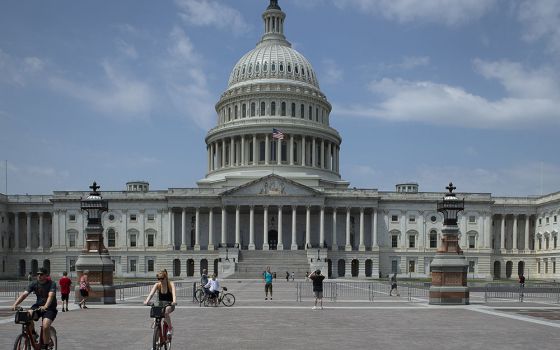
Leela Kuikel celebrates his father's birthday with his mother, his wife and their children. (Courtesy of Leela Kuikel)
When he was 10 years old, Leela Kuikel knew he would never return to his home country again.
Fleeing political persecution in Bhutan, Leela Kuikel and his family spent 16 years in a Nepalese refugee camp, surviving on meager rations with no electricity or running water. Determined to build a future, he studied in a roofless school and later became a teacher before seizing the chance to resettle as a refugee in the U.S. in 2008.
Arriving in Cincinnati with his wife and parents, Kuikel started as a dishwasher and hotel front desk officer with help from Catholic Charities Southwestern Ohio and quickly climbed the ranks in the hospitality sector. Now a U.S. citizen, he is the CEO and founder of three companies, employing 650 people across Ohio and Kentucky.
Kuikel's success story is only one among the stories of more than 3.5 million refugees resettled in the U.S. through legal flights organized by the U.S. State Department from 1975 until the first weeks of 2025. The U.S. Catholic Conference of Bishops is one of only 10 resettlement agencies funded by the federal administration.
With a simple signature on two immigration executive orders Jan. 20, President Donald Trump paused for 90 days all flights of refugees arriving from Afghanistan, Syria, Rwanda, Chad, Guatemala and other countries, along with those who had already been thoroughly interviewed and screened in order to receive a refugee visa to live in the U.S., far from persecution.
Thanks to federal funds, Catholic Charities agencies, in conjunction with the U.S. bishops' Migration and Refugee Services, have assisted more than 1 million refugees across the country since 1975. Catholic Charities has helped those fleeing countries with wars and persecution to build new lives and find jobs. It has also provided for basic necessities such as food, health care and education.
Advertisement
After the Catholic bishops' conference said in a Jan. 21 statement that Trump's executive orders on immigration are "deeply troubling" and "will have negative consequences," Vice President JD Vance, a Catholic convert, sharply criticized the bishops' conference and suggested that financial motivations were behind their efforts in helping refugees. Vance said he thinks that the bishops' conference "has not been a good partner in enforcing common sense on immigration" and that the bishops should "look in the mirror" regarding the federal funding they receive for refugee resettlement.
In 1992, Kuikel had to leave everything behind and flee Bhutan forever with his parents because of political persecution as part of the local Hindu community. They moved to a large U.N.-supported refugee camp in Nepal, where, he said, he lived for about 16 years on only 9 pounds of rice every 15 days and sporadic vegetables with no electricity or running water.
He saw his life changing when he heard in 2007 that he could apply for a refugee resettlement program in the United States. Kuikel sent in his application, and after less than a year and several interviews, in 2008 he was resettled on a refugee visa in Cincinnati with his wife and parents.
Kuikel, who has been a U.S. citizen since 2014, is chief executive officer and founder of three companies that employ about 650 people in Ohio and Kentucky. But the beginning of his career was anything but easy.
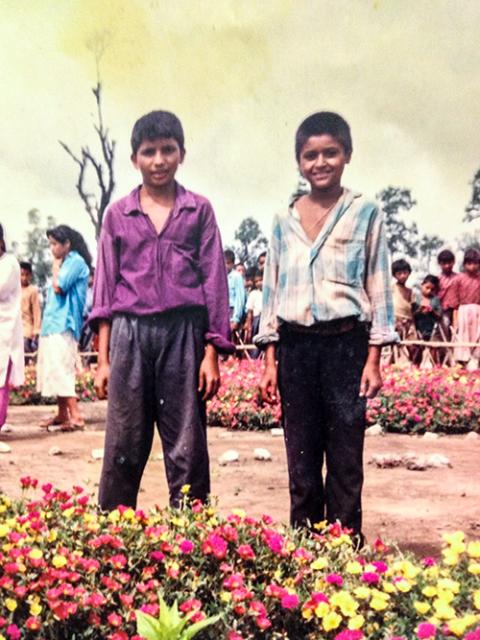
Leela Kuikel (right) with a friend in 1993, in the refugee camp in Nepal where he lived for about 16 years (Courtesy of Leela Kuikel)
Thanks to support from Catholic Charities Southwestern Ohio, he began working at a luxury Cincinnati hotel as a dishwasher, valet and front desk officer. After only three months, he became housekeeping manager and food and beverage manager.
After almost two years, in 2010, Kuikel was then hired by Hyatt Hotels Corp., where he managed about 300 other housekeepers. In 2015, he left the hotel chain and started his new life as an entrepreneur. He founded and developed Healthy Home Care in Cincinnati and Healthy Adult Day Healthcare in Florence, Kentucky. Kuikel has become a prominent figure in the elderly care sector, providing medical and nonmedical transportation for hundreds of elderly and disabled citizens and children with autism or depression.
Kuikel said his native culture, where love for parents and grandparents is considered sacred, gave him the inspiration to take care of the elderly and the most vulnerable. To this day, Kuikel resides in Kentucky with his parents in their 80s, his wife and his two children.
"Catholic Charities managed for us the necessity to build up the foundation, so that I could be OK and survive with a job. They build the foundation for refugees," Kuikel said in an interview. "I'm really grateful to Catholic Charities."
In 2024 alone, Catholic Charities Southwestern Ohio resettled 311 refugees from multiple backgrounds, including individuals from the Democratic Republic of Congo, Syria, Venezuela, and Afghanistan, said Tony Stieritz, CEO of the organization.
Once refugees arrive, Catholic Charities ensures they have housing, employment, education, and health screenings to integrate into their new communities. "We make sure the kids get enrolled in school, that those who are able to work are immediately working. We ensure that they're employed and are working at a living wage," Stieritz said.
Catholic Charities receives a stipend per refugee, covering some resettlement living costs, but the agency relies heavily on private donations and volunteers to sustain operations. "What we receive from the federal government does not, in essence, keep the lights on for the resettlement program," Stieritz noted, highlighting the financial challenges of the work.
Stieritz said that the announcement of the 90-day pause and potential cancellation of the resettlement program created confusion and fear. Before Trump signed his executive orders, officers and volunteers at Catholic Charities in Cincinnati had already been given information that entire refugee families from Zambia, Tanzania, Chad, Rwanda, Pakistan, Guatemala and Ecuador were due to arrive in February.
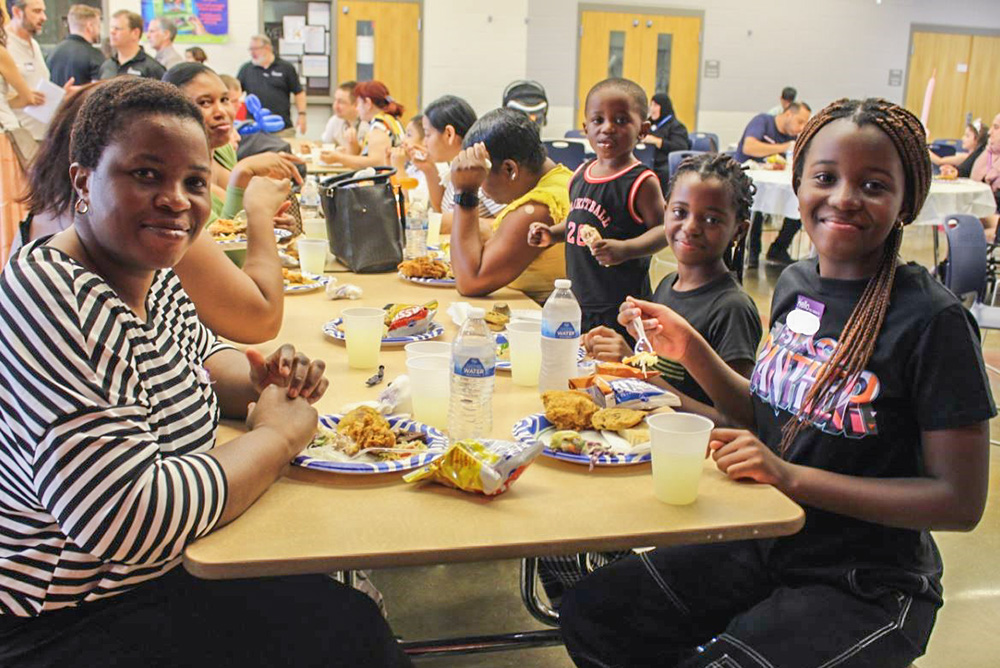
Cincinnati-based refugees celebrate Catholic Charities' World Refugee Day event at the Academy of Multilingual Immersion Studies in Cincinnati in June 2024. (Courtesy of Catholic Charities Southwestern Ohio/David Taylor)
Their resettlement flights have been canceled, and the refugees will remain in their respective refugee camps, but Stiertiz said Catholic Charities will still continue to work with refugees who have already been resettled in Ohio.
"We exist to do our work because the Gospel commands us to and we are going to maintain whatever capacity we are able to serve people in their moments of vulnerability, as Jesus Christ commanded us," Stieritz said. "What has been heartening in all of this is that we have seen the community step forward in extraordinary ways to want to ensure as much as possible that we can continue to do this through thick and thin."
Catholic Charities offers refugees a comprehensive support system that includes cultural orientation, financial literacy and job readiness classes led by volunteers. The classes are designed to assist refugees in becoming self-sufficient in their new environment.
After seeing a local news report on a family of Syrian refugees resettling in Cincinnati in 2016, Debbie Kokoruda, who at the time had recently retired from Procter & Gamble, immediately reached out to Catholic Charities, and soon became one of the most active volunteers.
Initially, Kokoruda helped families settle into their new homes, furnishing apartments with essential items provided by the organization's warehouse. Over time, she expanded her involvement by teaching classes on job readiness. "I began teaching those classes, and that's really where my passion lies," she said. As a volunteer, she helps refugees navigate the complexities of American work culture, teaching them how to write job applications and to secure employment.
Over the years, Kokoruda has assisted hundreds of refugees from countries such as Tanzania, Venezuela and South Sudan. Her most memorable experiences have been the stories of success from those she helped. "I remember one event, we had a large Bhutanese group. They wanted us to know how thankful they were, because now they had started buying houses," she said.
She also recalled a former student who, after starting in restaurant work, opened a successful local catering business specializing in Mediterranean cuisine. "It's the most phenomenal Mediterranean food I've ever had," Kokoruda said with a hearty smile.
With the potential for severe cuts to refugee programs, Kokoruda said she remains hopeful for the future. "I just hope that this changes, so that the refugee program comes back and it comes back quickly," she said.
Many of these refugees, she said, had worked for the U.S. military and were now left in peril. "I mean, why would anybody want to help us in other countries? These Afghan men and women were translators. Our military couldn't have been successful without them, and we leave them stranded at an airport and never let them come in?"
Richard Herman, a Cleveland-based immigration attorney, told NCR that Trump's halt of the resettlement program could hardly face legal challenges, since the precise number of refugees who can enter the U.S. each year is decided on a legal basis by the White House. As for refugees who have already been resettled in the U.S., Herman said their legal status remains secure, as long as they do not commit crimes.
However, he warned that Trump's policies extend beyond undocumented immigrants, affecting legal immigration as well. "Let's be honest, the Trump agenda is based on race," he said. "It's not a wave of Irish immigrants anymore, or British immigrants, or German or Western European. It's a wave of Asian, African, Middle East and Latin American immigrants. And the disruption, the perceived disruption, in the racial balance in the U.S. is really what's driving this."
For legal immigrants navigating an already slow system, things could get even worse, he said. "What Trump is already doing, and we saw this in Trump 1.0, he is going to try to muck up legal immigration to slow it down," Herman predicted. A method could be freezing federal hiring and giving buyouts to federal immigration workers, which could cripple the U.S. immigration services and agencies responsible for processing immigration cases.
"My clients are calling me. They're afraid. People that are legal are afraid, but people that are undocumented are definitely afraid. They're seeing ICE coming through their neighborhoods. Some of them are not going to work. Some of them are not sending their kids to school," he said.
Kuikel's gratitude toward Catholic Charities is still palpable as he recalls the pivotal role the organization played in his journey to a new and thriving life in the United States. However, Kuikel said his sense of gratitude is tempered by a deep sadness over the current political climate, particularly after Trump's immigration executive orders.
"I feel bad about it because I was a refugee," he said.
"If the United States did not give me the opportunity to come here, I would not be in this position. I'm giving employment to around 500 to 600 people. I was a refugee, and I did these much better things. In other refugee camps, they also have potential like me."





